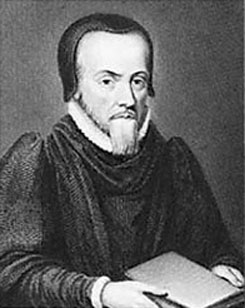Belated Thoughts on Richard Hooker, pt I
 |
| Richard Hooker |
Before I begin, let me make one observation about Richard Hooker. If you have spent any time in the Episcopal church, you have at some point probably heard some clergy go on about Hooker's 3-legged stool of reason, scripture, and tradition. This is actually an example of an Episcopal church urban legend promulgated by clergy who can't be bothered to actually read Hooker's Laws of Ecclesiatical Polity. Hooker never said anything about a three legged stool. He does talk at length about things like reason, scripture, and tradition, but he would have been horrified (he was in the English reformer mold) if he were to learn that people now think he actually somehow put reason and tradition on some completely equal footing with holy writ.
Things like reason and tradition were important to Hooker, but he equated them more to the lenses through which we look at Scripture, not as entities somehow co-equal to the Word of God. If you ever hear someone promulgating that Theological Urban Legend, please correct them or at least ask them to cite their source. If Anglican theology does have a 3-legged stool (and I'm not convinced it actually does), it didn't come from Richard Hooker. In fact, one could argue from his writings that he also believed that Toleration and Nature were likewise lenses through which we should look at Scripture and our walk as Anglican Christians, all woven together in the tapestry of Anglican faith. I will continue to elaborate these points in a subsequent blog entry in this crash course introduction series on Hooker.
All that having been said, Richard Hooker was an Anglican cleric in the latter half of the 1500's, dying on November 3rd, AD 1600, hence his feast day on our current calendar. In understanding Hooker, one has to understand the time period when he lived. Surprisingly, the times in which he lived are eerily similar to our own in the 21st century, which I believe make him all the more relevant.
He lived entirely during the reign of Queen Elizabeth I, who died in 1603. Shakespeare lived during Hooker's life time, dying in 1616. The Spanish Armada was defeated in 1589, ending Catholic plans to retake England in another religious war, although the French continued to be a threat well into the 1800s. On top of this, the Industrial Revolution was beginning to dawn, which shook the very foundation of the way people had lived for centuries, particularly in the realms of farming and the traditional village green.
On the political front, the Gunpowder plot to blow up Parliament with a bomb by a Catholic extremist occurred in 1605, an event that emboldened the government into a massive new power grab in the name of what we would now call "national security." People were scared to death of terror plots and religious wars and plagues, as 1602-03 saw the last major outbreak of the Black Death in London, killing several thousand people and the last five years of the 1500s saw a massive famine in Russia that killed over 500000 people.
On top of that, Elizabeth I left her successor a massive government debt of 400000 pounds, a gargantuan sum at the time. Fist fights commonly broke out on the floor of the Houses of Parliament. Government graft was the way things worked. And the Government was involved in becoming the first international drug syndicate, supplying opium to the masses in China via the East India Company in 1602.
The Anglican church was not in much better shape by 1600. King James Version of the Bible was not published until after Hooker's death in 1611. Bishops in the Church of England couldn't seem to agree on anything, and called international meetings to avert schisms. Case in point: the Hampton Court Conference of 1604 was called by the Archbishop of Canterbury to prevent an all breaking apart of the church over some theological matters. The only thing the conference accomplished was to pass a resolution calling for "the extermination of the Jesuits and all vestiges of Popery in the Realm of England."
All this sounds familiar does it not?
Thus, when Hooker speaks of tolerance, he isn't being banal or mouthing politically correct platitudes. He was being quite contemporary because 1600 was in some ways like America in the post-9/11 world and the Anglican church was in just as much turmoil as it is now.
This was the world of Richard Hooker. Keep this in mind in my next few entries over the next few days about the theology and politics of the man. It explains a lot about his understanding of Laws and Ecclesiastical Polity and relationship of Church and State. I will try to touch of these themes so that we might understand and appreciate the man who is in many ways a definer of Classical Anglican Theology.
Stay tuned...
Comments
"in the name of what we would not call"
Might read "now" call?